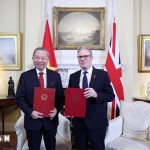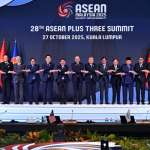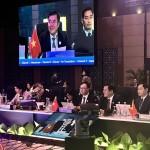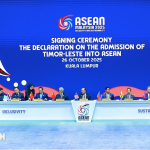Total number of posts 463.
Information at the recent meeting of the Interagency Steering Committee on International Economic Integration (Steering Committee), Deputy Prime Minister Tran Hong Ha emphasized that the economy is a very important pillar and a pioneer in international integration activities. The Steering Committee is interdisciplinary with the participation of ministries, branches and big cities, therefore, it is necessary to create close links to promote international economic integration activities with the comprehensive participation of all economic sectors.
The Deputy Prime Minister asked members of the Steering Committee to comprehensively assess Vietnam's participation in free trade agreements (FTAs), especially the competitiveness of domestic enterprises; analyze policies on international economic integration in the face of changes, rapid fluctuations and unpredictability of the global economic context and value chain; the crisis of the economic model in the world...
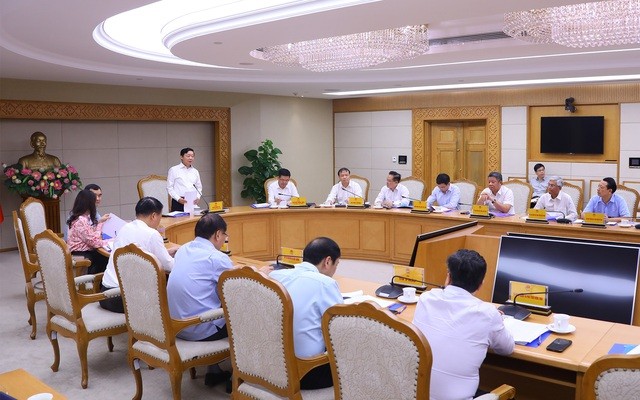
Deputy Prime Minister Tran Hong Ha chaired the meeting of the Interagency Steering Committee on International Economic Integration (Steering Committee), in the afternoon of July 10, at the Government Headquarters - Photo: VGP
"The Steering Committee also needs to come up with a flexible operating mechanism, promptly react to emerging issues based on the proposals and findings of Steering Committee members" - Deputy Prime Minister emphasized.
According to the report of the Ministry of Industry and Trade, the standing agency of the Steering Committee, over the past time, international economic integration has achieved many important results such as contributing to the improvement of the legal system and economic institutions; improve the quality of economic growth, national competitiveness, enterprises and products; promote exports, improve trade balance; contributing to increasing the attraction of foreign direct investment.
Up to now, Vietnam has been participating in 17 FTAs, preparing to negotiate to participate in a number of bilateral and multilateral trade agreements. The FTAs that Vietnam participates in cover most continents with over 60 economies with a total GDP accounting for nearly 90% of world GDP, including 15 G20 member countries. In which, 16 FTAs came into effect, contributing to expanding export markets, strengthening traditional markets, creating conditions for Vietnamese enterprises to have opportunities to participate in potential markets in the world. In all markets, Vietnam with FTAs recorded outstanding export growth, higher next year than the previous year.
In addition, in politics and diplomacy, the participation in FTAs contributes to enhancing the country's foreign policy position, enhancing the intertwining of interests with key partners, contributing to ensuring a peaceful and stable environment for national development.
In 2022, the first year all 15 FTAs signed take effect, Vietnam's total import-export turnover with FTA partner markets reached 526 billion USD, accounting for 72% of Vietnam's total import-export turnover with the world. In which, exports reached 238 billion USD, accounting for nearly 64% of export turnover. That shows that most of the trade flows of Vietnamese goods are with FTA partners. Trade with these markets is one of the great drivers of production and business growth of our country's economy.
Taking advantage of tariff preferences of the FTA in 2022 reached 78.3 billion USD, equivalent to 33.6% of total export turnover to these markets. In comparison with many countries in the region and the world, this is quite optimistic.
However, limitations in the implementation of FTAs over the past time have manifested themselves in a number of aspects. In terms of export growth to FTA markets, there is no outperformance compared to some markets without FTAs. The rate of preferential use of FTA tariffs is on a downward trend (from a record of 39.7% in 2018 to 32.7% in 2021 and has only slightly improved to 33.6% in 2022) and the progress is unstable with each agreement.
This shows that businesses do not seem to have a stable strategy for taking advantage of incentives. The obstacles that make it difficult for businesses to realize potential opportunities from FTAs, VCCI's survey in 2022 also showed that businesses are most concerned about market fluctuations and instability (46.8%), limitations in the competitiveness of enterprises (46.4%), lack of information about commitments and how to apply (40.1%), inadequacies in the implementation organization of FTAs of State agencies (28.2%).
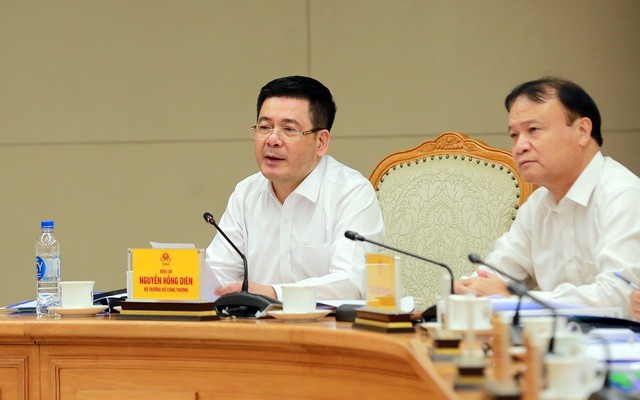
Minister of Industry and Trade Nguyen Hong Dien discussed some issues in international economic integration - Photo: VGP
Mr. Luong Hoang Thai - Director General of Multilateral Trade Policy Department (Ministry of Industry and Trade) said that import and export turnover under new-generation FTAs has surpassed traditional FTAs, showing the right direction in market diversification. However, the trend of international economic integration is having new problems emerging with new standards and regulations on environmental protection, digital, clean energy...
Deputy Prime Minister Tran Hong Ha affirmed that international economic integration is a bright spot in the country's development process. However, we have not had proactive policies and fully prepared capacity to take advantage of FTAs and effective economic integration.
"The world is facing comprehensive changes in geopolitics, economy, trade, competition between major powers... along with the inevitable trend of green economy, circular economy, renewable energy, net zero greenhouse gas emission reduction (Net Zero) ... thereby, identifying appropriate approaches, turning these challenges into advantages and development opportunities", Deputy Prime Minister analyzed.
The Deputy Prime Minister affirmed that the State must play a leading role in the process of negotiating international economic integration in combination with the implementation of global goals; institutionalize, create a legal environment, policies, standards and regulations, raise awareness of businesses and people on a par with international partners; select national brands to build into international brands in the spirit of "doing the world at a high level, Vietnamese people also enjoy".
From advantages and successful experience in the digital transformation process, the Deputy Prime Minister said that it is necessary to prepare the roadmap and plan of the State in selecting a number of priority areas in international economic integration, to build a green economy, protect nature, etc using renewable energy...
The Deputy Prime Minister stated that the attraction of foreign direct investment (FDI) in the coming time is not incentives for land, tax, cheap labor but renewable energy, high-quality human resources, digital resources, solutions to respond to climate change through afforestation, etc Net Zero...
In addition, emphasizing the role of enterprises as direct implementers of international economic integration, the Deputy Prime Minister said that at present, many economic sectors have been based on other technology levels such as renewable energy, green industry... Therefore, businesses need to take advantage of FDI resources to train people, change thinking, awareness, working methods, grasp technology, open up new fields based on high-tech investment.








